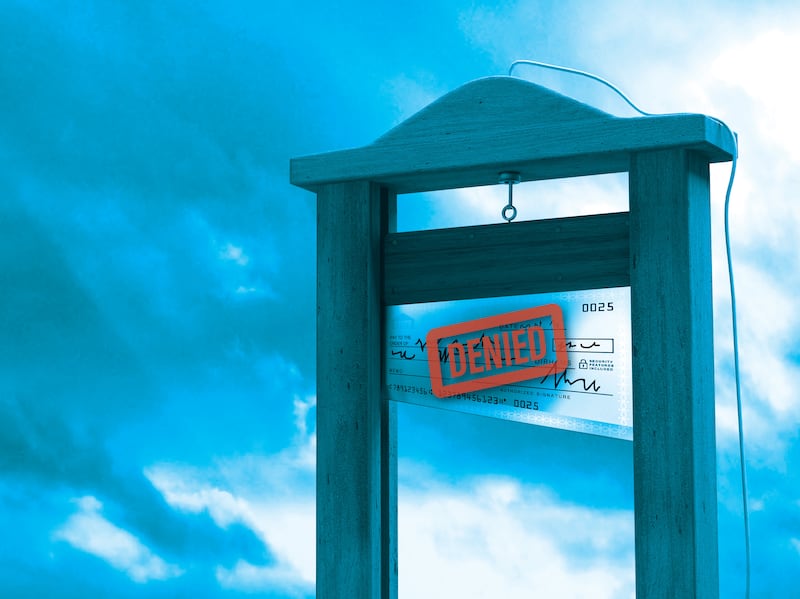I recently found out that I have a bounced cheque case against me in Dubai despite not receiving a message from the police.
During the coronavirus pandemic, I lost my job and returned to my home country in 2020. I had a credit card and a personal loan and my debts totalled Dh40,000 ($10,891). My bank presented my security cheque and it bounced.
Since I was unemployed, I could not pay the instalments. Last year, the amount that I was required to pay the bank had risen to Dh65,000 because of late fines and interest. With the legal case, the bank is now demanding a payment of Dh100,000.
I am back in the UAE with a job that pays a monthly salary of Dh10,000. I'm scared to go to jail, as I have three children and am the sole breadwinner in my family.
Is there any way I can negotiate with the bank to reduce the amount? I went to Dubai Courts to seek some help but was told that they can't do anything and I was instructed to pay the full amount. SS, Sharjah
Debt Panellist 1: R Deepakchandran, group head of retail products at Emirates NBD
Financial emergencies can trigger a cycle of debt, particularly when unforeseen expenses exceed your available funds.
Creating a safety net, which encompasses savings, credit card/loan insurance and an emergency fund, can serve as a lifeline during difficult times.
In this challenging scenario, your initial step should be to reach out to the bank’s collections team and candidly discuss your situation, while expressing your commitment to making payments.
Transparency and furnishing comprehensive details regarding your financial state are essential when interacting with the collections team.
Many banks often provide restructuring options in such circumstances, allowing for a phased settlement over a specified time frame, potentially including discounted offers. Effectively communicating your circumstances to the bank is pivotal in working towards an amicable solution that benefits both parties.
To inquire about the execution of the cheque case, it is advisable to initiate direct communication with your respective bank to work towards a mutually agreeable solution. Alternatively, you can consider seeking legal representation and contacting the court.
Although repaying the dues in your current circumstances is difficult, having a well-defined plan in place will enable you to regain your financial independence.
Debt panellist 2: Jaya Ratnani, managing partner at Freed Financial Services
It’s important to note that we are not a law firm, and this is not legal advice. You may want to consider seeking a legal opinion for your case. However, here are a few things to consider.
The UAE authorities recently introduced new reforms concerning bounced cheques and has made changes to the punishment related to bounced-cheque offences.
In the past, if a cheque bounced due to lack of funds, it could result in a jail term. However, as per the revised law, a bounced cheque due to insufficient funds will not result in imprisonment or criminal charges.
Leaving the country with unpaid debt is not a solution, as the interest accumulated can grow into a monstrous sum that will eventually be difficult to pay.
Despite the situation which made you leave the country, one should always keep in touch with the bank, which will go a long way in demonstrating your intention to pay.
Upon finding new employment and returning to the country, you should have contacted the bank and requested a settlement plan.
The banks are usually considerate and, based on the situation, can reduce a large sum of interest payments and provide a flexible payment plan towards the closure of debt.
Once the bank has incurred legal expenses and court fees to recover its debt, it shall do its utmost to claim the total outstanding owed.
In your situation, one solution is to represent yourself in court directly or appoint a lawyer and request a settlement plan based on your ability to pay.
You will need to provide the court with a formal letter of request indicating the amount you can afford to pay each month. Documentary evidence will include your cash flow, proof of income and expenses with corresponding bank statements.
Based on the bank's acceptance of this proposal, a formal settlement agreement shall be signed in court.
Alternately, you can meet the bank and request a payment plan. They may be able to work with you to reach a settlement that is more manageable in your current financial situation.
Debt panellist 3: Alison Soltani, founder of Leap Savvy Savers
When you have debt and lose your job, it is always advisable to contact the bank and explain your situation. It may be able to offer a payment holiday or restructure the loan to reduce your monthly instalments.
Leaving the debt unpaid without contacting the lender will lead to compounding interest and possibly a legal case, as you have discovered.
You can check whether you have any criminal cases filed against you by downloading the Dubai Police app or checking the website and entering your Emirates ID number. You will see the status of any criminal cases filed against you.
It is likely that following three to six months of non-payment of debt, the bank deposited your security cheque.
If the account has insufficient funds and the cheque bounces, the lender may file a legal case against you.
Unpaid debts are often passed on to collection agencies. If they contact you, ensure you verify the validity of their request by asking for written communication, then negotiate payment terms and request documentation. If you are unsure of how to proceed, seek legal advice.
I would certainly contact the bank and explain your situation, then negotiate terms to begin repaying the debt.
Before approaching the lender, ensure that you have a clear understanding of your financial position and how much you can realistically pay each month while continuing to meet other financial obligations.
If you have savings or an asset that you can sell to offer the lender a lump-sum payment towards the debt, this could be favourable for your situation.
It may also be worth speaking to your spouse or extended family and asking for support. Even if they cannot support you financially, they may be able to help in other ways, such as providing childcare if you or your spouse choose to work longer hours to repay the debt.
Should the case go to court, you will be liable to pay the loan and associated fees in full, terms will be drawn up and restrictions may be imposed on you, such as a travel ban and surrender of your passport until the debt is settled.
Once this situation is resolved, it would be wise to build an emergency savings fund to cover any financial obligations in the case of an unexpected job loss or other crisis which may occur in the future.
The Debt Panel is a weekly column to help readers tackle their debts more effectively. If you have a question for the panel, write to pf@thenational.ae







